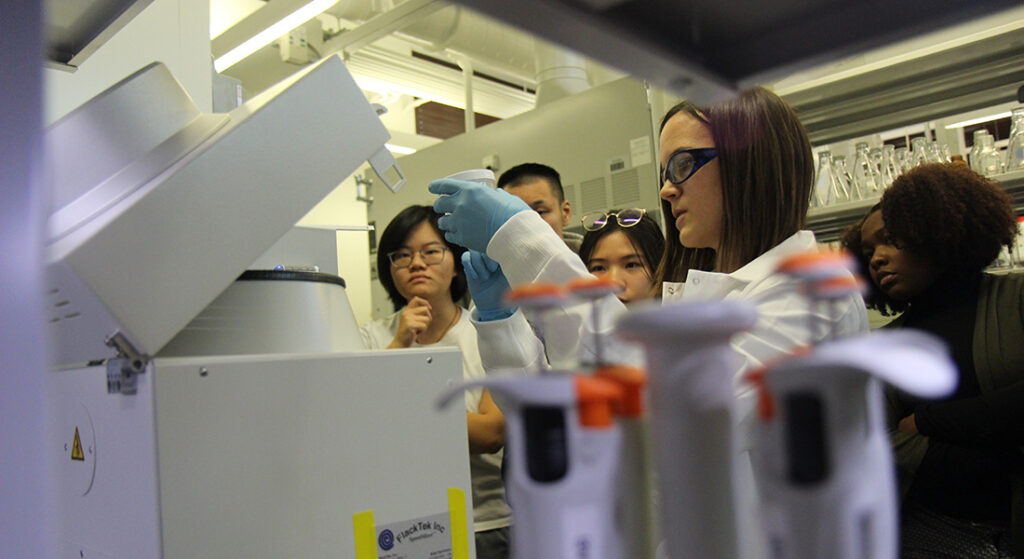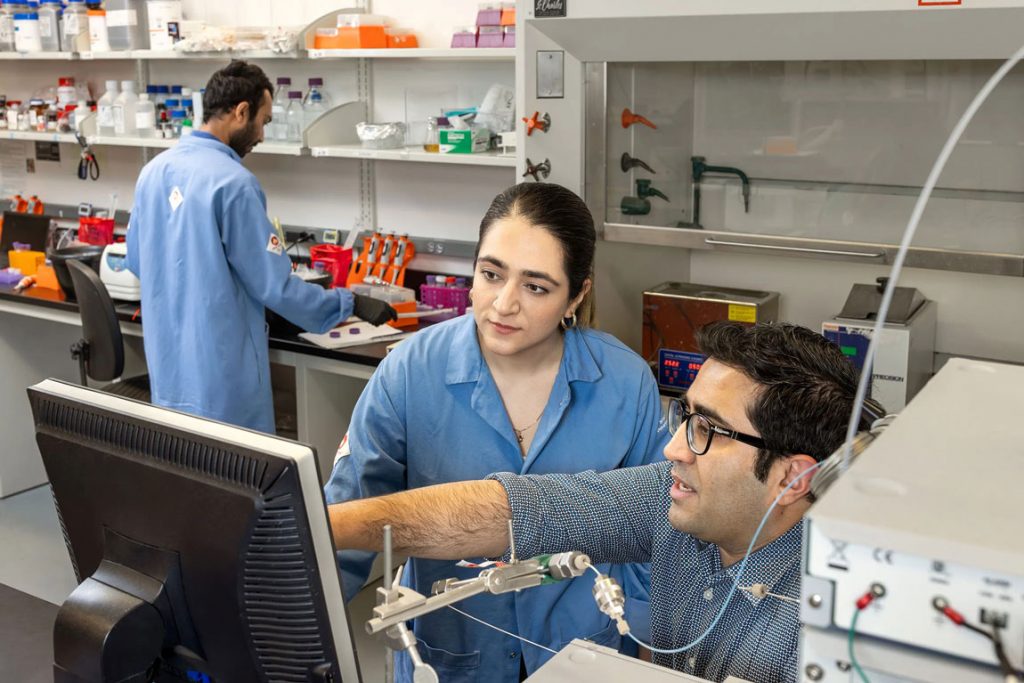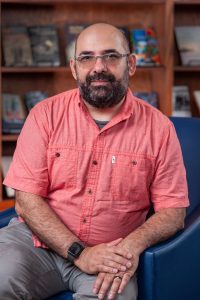The creator of the term “bio art,” an expressive form that interprets scientific principles and concepts through artistic installations, exhibitions and performances, is the keynote speaker for the University’s annual Kashi and Kameshwar C. Wali Lecture in the Sciences and Humanities.
News
BioInspired Wins NSF Grant to Develop Graduate Training Program in Emergent Intelligence
Syracuse University’s BioInspired Institute has been awarded a $3 million grant from the U.S. National Science Foundation (NSF) Research Traineeship Program for the creation of an interdisciplinary training program for doctoral students in emergent intelligence.
Preparing the Next Generation of Biomedical and Chemical Engineers
The ESTEEMED LEADERS program at Syracuse University recruits and trains the next generation of biomedical engineers. Made possible by the National Institute of Health, the program supports undergraduate students from historically underserved backgrounds.
Biomedical and Chemical Engineering Professor Mary Beth Monroe Receives 2023 Rosalind Franklin Society Special Award in Science
 Mary Beth Monroe, an associate professor of biomedical and chemical engineering at the Syracuse University College of Engineering and Computer Science, has been selected to receive the 2023 Rosalind Franklin Society Special (RFS) Award in Science.
Mary Beth Monroe, an associate professor of biomedical and chemical engineering at the Syracuse University College of Engineering and Computer Science, has been selected to receive the 2023 Rosalind Franklin Society Special (RFS) Award in Science.
The RFS Awards in Science recognize contributions and dedication to advancing scientific knowledge, and outstanding peer-reviewed research by women and underrepresented minorities in STEM. The anthology of award winners is available digitally on the Rosalind Franklin Society website and in print.
Innovative sepsis treatment: Juntao Luo, PhD, secures over $2 mil from NIGMS to develop nanotechnology-based therapeutic for life-threatening condition
Continuing his tireless efforts to find an effective treatment for severe sepsis, Juntao Luo, PhD will be developing an innovative treatment for the condition that has a mortality rate of 30-40%. With a newly awarded over $2 million fund from the National Institute of General Medical Sciences (NIGMS), he’ll spend the next five years turning his nanotechnology into a bioactive therapeutic that could help prevent sepsis deaths, and potentially treat a wide range of inflammatory diseases. Continue Reading
Unlocking Proteins’ Potential

Syracuse University researcher is pioneering new methods of protein engineering.
Davoud Mozhdehi, associate professor of chemistry in Syracuse University’s College of Arts and Sciences, likes to tinker with proteins. Through protein engineering, he believes there’s much to discover about the inner workings of lipidated proteins, which are equipped with oil-like appendages (lipids) that interact with cell membranes and are vital to cell functions like signaling and trafficking. “We’re trying to develop platforms to facilitate attaching lipids to proteins and to use the unique properties of lipids to tune the properties of proteins for various applications,” he says.
Samuel Herberg and Pranav Soman awarded $439,000 grant to develop 3D-model for studying glaucoma’s mechanisms

Glaucoma affects 3 million Americans, is incurable, and is the second leading cause of blindness worldwide. Even with the disease’s prevalence, how and why it develops is still largely not understood.
Samuel Herberg, PhD, is an assistant professor of ophthalmology & visual sciences, as well as a researcher at Upstate’s Center for Vision Research, is working to create new ways to study the cells and structures in the eye that can help better understand glaucoma. He was recently awarded $439k from the National Eye Institute (NEI) over two years to develop a unique 3D model to study specific mechanisms of fluid outflow and pressure regulation in the eye. Continue Reading
Creating better tools to study glaucoma; Preethi Ganapathy developing 3D model to study optic nerve cells
Using a grant from the National Eye Institute, an Upstate researcher and ophthalmologist plans to create a new way to test the potential causes of and contributors to glaucoma. Assistant professor Preethi S. Ganapathy, MD, PhD, was awarded $447,000 over two years to develop a model that could help overcome a hurdle researchers face while studying the neurodegenerative disease. Currently, glaucoma affects 3 million Americans, is incurable, and is the second leading cause of blindness worldwide.
BioInspired Solicits Letters of Intent for Team Science Support
We are writing today with exciting news about the evolution of our seed grant program. These past programs have focused on identifying and supporting collaborative teams that could help build toward large-scale, collaborative grants. Now, we believe several of these teams and likely others from among our members are ready to focus attention on center-grant funding or other multi-investigator opportunities (e.g., NSF MRSEC, NSF BII, DoD MURI, NIH P01). In conversations with Syracuse University’s Office of Research, we have advocated for concrete ways to support teams working on these types of funding opportunities to maintain the growth of the Institute and the University’s research community.
We now expect the Office of Research to very soon launch a standing program designed to facilitate team science and to support faculty pursuing funding opportunities that require a collaborative approach. In anticipation of this imminent program, the Institute is soliciting letters of intent (LOIs) on a rolling basis for teams to describe their existing collaborations and their broader vision for the work and to identify gaps in the team. After interviews with applicants, we will work with teams to develop applications to the team science program from the Office of Research. Continue Reading
2024 Wasserstrom Prize for Graduate Teaching Presented to Physics Professor Christian Santangelo
Award given in memory of noted professor of English William Wasserstrom.

Christian Santangelo, professor and director of graduate studies in the physics department of the College of Arts and Sciences (A&S) and member of the BioInspired Institute, is the 2024 recipient of the William Wasserstrom Prize in recognition of his exemplary mentorship of graduate students. A&S Dean Behzad Mortazavi will confer the award on Santangelo at the Graduate School doctoral hooding ceremony on May 10.
